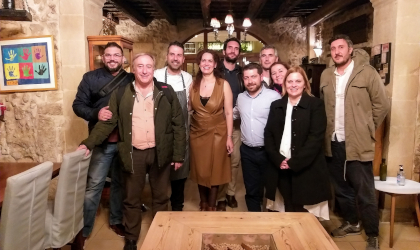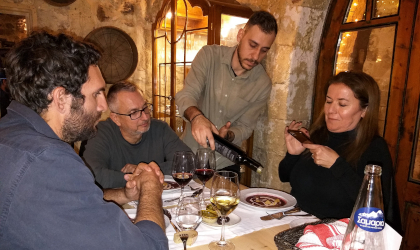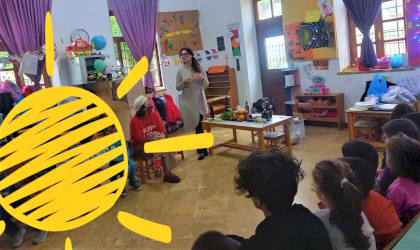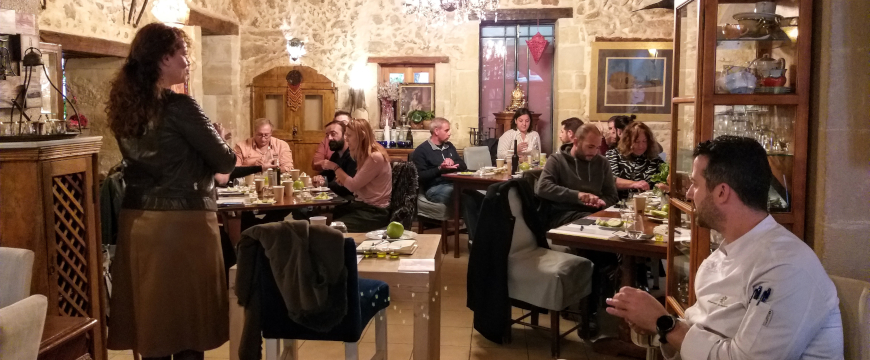On World Olive Day, two dozen olive oil enthusiasts gathered at Avli Restaurant in Rethymno, Crete for a day-long olive oil tasting and food pairing workshop. Led by an olive oil tasting expert trained in Spain and an award-winning Greek chef, this diverse group came together to explore the flavors and aromas of a key element of the Mediterranean diet.
The November 26 event convened curious olive oil producers, chefs, tourism professionals, scientists, consultants, competition judges, and government officials from Greece and seven other countries. With an “Expert of virgin olive oil tasting” diploma from the University of Jaen, Spain, and years of experience leading olive oil seminars with the Elia Quality Group in Greece, Irini Kokolaki was well prepared to answer all the participants’ questions.

Olive Oil Tasting
Irini started by explaining the olive oil tasting techniques used by professional judges, referring to the lists of positive and negative characteristics and aromatic notes of olive oil on the placemats in front of us. Covered containers featuring 15 ml of different extra virgin olive oils (EVOOs) were arranged on the placemats.
Speaking in Greek, with a colleague providing an English translation for those who needed it, Irini told us how to judge the intensity of an EVOO’s fruitiness based on how close a sample must come to our noses before we detect the fruity aroma.
• 0-3, delicate or light fruitiness: must put nose inside cup to detect fruitiness
• 3-6, medium intensity: hold cup between nose and chin to detect fruitiness
• 6+, robust or intense fruitiness: can detect fruitiness from farther away
The defects or negative characteristics of an olive oil could be (among others) muddy, vinegary, earthy, rancid, metallic, or greasy. EVOO can have a very wide range of positive aromas of either green fruitiness or ripe fruitiness, with scents of tomato or tomato leaf, greens, and grass very common in Greece, and aromas of flowers and fruits and vegetables such as banana, apple, herbs, and green pepper among the many possibilities. Desirable flavors perceived by the tongue are sweetness, bitterness, and (at the back of the throat) pungency, with the latter sometimes inducing a cough.
We started by smelling and tasting eight Greek extra virgin olive oils. Throughout the tasting day, Irini invited us to share our impressions of each oil, then explained which aromas and flavors are typical of each olive variety, and which of them trained tasters were likely to detect in each particular sample.
For example, Koroneiki olives tend to yield oils with greater pungency detectable in the throat, while Makri olives generally produce oils with very fruity aromas and less pungency and bitterness. Chalkidiki (or Halkidiki) EVOO can offer hints of greens, herbs, unripe tomato leaf, and black pepper—at least to the initiated. Irini comforted those who could not detect so many aromas or flavors by pointing out that this takes practice.
Irini explained what affects an olive oil’s aromas and flavors, such as processing, handling, filtering, and storage methods and timing. She also mentioned the way olive oil alters over time, summarizing some of the reasons for the changes. She emphasized the difference between early harvest and late harvest olive oils, and by tasting oils from both last year’s and this year’s harvests we could see that the age of the oil affected its aroma and flavor, with fruitiness decreasing over time.
A sampling of five Spanish extra virgin olive oils focused mainly on oils made from the Picual olive variety, the most common variety used for olive oil in Spain (plus one Hojiblanca EVOO). The seven Italian EVOOs we tasted included blends and monovarietal (single-variety) oils made from Maurino, Frantoio, and Dritta olives.
An International Olive Oil Experience
The international nature of this World Olive Day event was enhanced by the online participation of Spanish and Italian olive oil professionals. The director general of Oleicola San Francisco, a Spanish company that won one of the highly prestigious Mario Solinas first prizes this year, spoke about transforming his business with a focus on quality and olive oil tourism that was unusual in Spain a decade ago. Our final tasting of an Italian blend was discussed with the Monaco company owner, via Italian-Greek translation by Irini.
The Spanish and Italian experts emphasized the way olive oil quality is impacted by cleanliness, fruit freshness, production within a few hours of the harvest, and immediate filtering, and discussed the usefulness of teaching consumers about EVOO selection and health benefits, using several different languages in order to reach more markets.
Since there are 100 Greek olive varieties, and 600 varieties worldwide, there was only time to begin an exploration of the world’s olive oils. Yet even this small sampling made it clear that there are countless options: we can choose sweeter or more bitter or pungent extra virgin olive oils with various flavor profiles, depending on our preferences and our cooking and finishing needs.

Food Pairing at a Dinner by Best Olive Oil Chef Vasilis Leonidou
The day ended with an olive oil / food pairing experience created by Vasilis Leonidou, the executive olive oil chef at Avli Restaurant, who was designated the “Best Olive Oil Chef” in the world for 2017 by the Flos Olei international olive oil guide from Italy.
Vasilis explained how he started his cooking career using a low-quality olive oil without realizing it, but then made major changes after attending olive oil seminars in Greece and Italy, eventually experimenting with olive oil / food pairing in unique ways that earned him distinction for his achievements. For a number of years now, he has been featuring more than 40 EVOOs in carefully considered combinations with specific ingredients, in dishes and menus he devises with the unique characteristics of each olive oil in mind.
The Menu for World Olive Day
- Handmade sourdough bread, olive oil butter, olives, and Faistos (Koroneiki) EVOO from Sitia, Crete
- Beet soup with cheesy cream, and Olio Monaco (Tortiglione) EVOO from Italy
- Green salad with herbs, pineapple, lotus fruit, chickpeas, pistachios, mild cheese, and Thema (Koroneiki) EVOO from Sitia, Crete
- Marinated, slow-cooked tender beef cheeks, cauliflower puree, (bulgur-like) hondros, and Oro Bailen (Hojiblanca) EVOO from Spain
- Chocolate mousse, ice cream, carob, and coffee with Esencial Olive (Arbequina) EVOO from Spain
Vasilis believes there are no rules for food pairing, but he would never use a very intense EVOO on a mild Greek fish--although tuna is more intense and can be paired with a high-intensity oil--and he does like more intense EVOOs with well-spiced beef.

World Olive Day for Kindergarteners, and Workshops for All
The November 26 day of flavorful discovery at Avli Restaurant enabled many moments of fellowship, conversation, and networking among participants—appropriate on a day celebrating the “peace, wisdom, and harmony” associated with the olive tree.
Another World Olive Day event took Irini Kokolaki to a kindergarten in Heraklion, Crete. There the children tasted five different EVOOs in playful groups where they tried to detect the aroma or flavor of fruit and vegetables in each olive oil.
A former language teacher who works in Greek, English, and French (and translates from Spanish and Italian as needed), Irini shares the flavors of extra virgin olive oil with all ages and various nationalities in workshops of varying duration. She is happy to arrange workshops for groups and individuals. Irini is well named, since her name means “Peace” in Greek, and olive branches symbolize peace.
Thanks to Irini Kokolaki for the photo from the kindergarten.
All businesses, organizations, and competitions involved with Greek olive oil, the Mediterranean diet, and/or agrotourism or food tourism in Greece, as well as others interested in supporting Greeks working in these sectors, are invited to consider the advertising and sponsorship opportunities on the Greek Liquid Gold: Authentic Extra Virgin Olive Oil website. The only wide-ranging English-language site focused on news and information from the Greek olive oil world, it has helped companies reach consumers in more than 220 countries around the globe.


